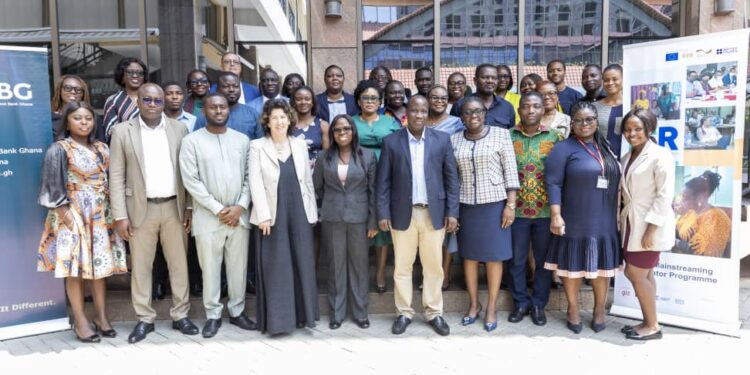DBG pledges GHS 700m financing support to Women-led businesses over the next 5 years
DBG is at the moment actively involved in capacity-building programs aimed at empowering women and youth-led businesses. Through these initiatives, over 1,850 women have been provided with essential training and support, equipping them with the skills and knowledge needed to thrive in the financial landscape
- Advertisement -
Deputy Chief Executive Officer (CEO) of the Development Bank Ghana (DBG), Michael Mensah-Baah, has announced plans by the wholesale, long-term capital provider to commit some GHS 700m to financing women-led businesses in the country.
The allocated GHS 700m which forms 10% of DBG’s total funding, will be disbursed over a period of three to five years.
- Advertisement -
Making the disclosure during the Stakeholder Workshop on Barriers and Opportunities to Women’s Access to Finances in Ghana, Mr Mensah-Baah averred women-led businesses are a core part of DBG’s focus in providing patient capital to business.
- Advertisement -
Further stating that, the DBG is committed to ensuring that 20% of all the businesses that receive DBG funding are owned by women.
“Women-led businesses are a core part of DBG’s focus. Firstly as a minimum, DBG is committed to using a minimum of 10% of its funding to support women-led businesses. This works out to over GHS 700m to be invested in women-led businesses in the next 3 to 5 years,” he quipped.
Small and medium enterprises (SMEs) as well as local corporates constitute more than 90% of businesses in Ghana yet are only able to access less than 10% of their financial needs through financial institutions.
Per the Mastercard Index of Women’s Entrepreneurship (MIWE), 46.4% of businesses in Ghana are owned by women.
Despite the critical role women play in economic development, access to finance has been a major constraint for women-owned businesses.
With an estimated $42 billion financing shortfall for African women-owned businesses as estimated by the AfDB across all value chains, women entrepreneurs encounter various obstacles when accessing finance.
- Advertisement -
The limited access to finance by women entrepreneurs translates into constrained overall economic growth and resilience and lost opportunities for all.
Speaking further at the Stakeholder Engagement, Mr Mensah-Baah quipped The Gender Mainstreaming Accelerator Programme (GMAP) which aims to provide capacity-building programs for targeted Partner Financial Institutions (PFIs) of DBG, presents a platform for creating a more equitable and inclusive financial ecosystem that serves the needs of all Ghanaians, particularly our women entrepreneurs.
According to him, the GMS has shed light on the key gaps and challenges hindering women’s access to finance, as well as the institutional, legal, and structural barriers that must be addressed to promote gender equality.
DBG is at the moment actively involved in capacity-building programs aimed at empowering women and youth-led businesses. Through these initiatives, over 1,850 women have been provided with essential training and support, equipping them with the skills and knowledge needed to thrive in the financial landscape.
Furthermore, DBG’s participation in initiatives such as the 2X Challenge underscores its dedication to advancing women’s economic empowerment. By joining this initiative as its 100th member, DBG is contributing to the mobilization of capital for projects that directly benefit women entrepreneurs, leaders, and stakeholders, thus amplifying their impact on the economy.
Additionally, DBG has endorsed the Women’s Empowerment Principles (WEPS), further solidifying its commitment to promoting gender equality and women’s empowerment.
By adhering to these principles, DBG is actively working to create a more inclusive workplace, marketplace, and community, where women have equal opportunities to thrive and succeed.
This goes a long way to show the importance DBG attaches to fostering a culture of diversity, equity, and inclusion, ultimately contributing to the sustainable development and prosperity of our nation.
Source:norvanreports
- Advertisement -



